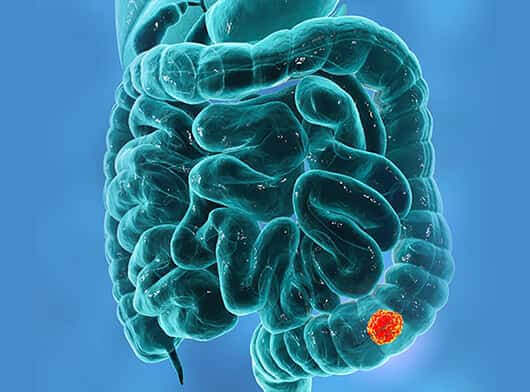- Surgery/ Procedures for early-stage colon cancer
- Radiation Therapy
- Medical Management
- Polypectomy (removing polyps during a colonoscopy) - If the cancer is in an early stage, small, localized, and completely contained within a polyp, the doctor may be able to remove it completely during a colonoscopy.
- Endoscopic mucosal resection - Larger polyps may be removed during colonoscopy using special tools in a procedure called Endoscopic mucosal resection.
- Laparoscopic surgery (minimally invasive surgery) - Polyps that can't be removed during a colonoscopy may be removed using laparoscopic surgery.
- Robotic Surgery in colon cancer is usually the best option, because the improved magnification of the operating area makes it possible for the surgeon to remove even the smallest tumor and of the patient is much faster.
- Surgery for advanced colon cancer If the cancer has grown into or through the colon, the surgeon may recommend:
- Partial colectomy - During this procedure, the surgeon removes part of the colon that contains the tumor along with a margin of normal tissue on either side. The surgeon is often able to reconnect the healthy portions of the colon. This procedure can be done by a minimally invasive approach – either through laparoscopy or Robotic surgery.
- When it's not possible to reconnect the healthy portions of the colon, the patient may need a Colostomy. In this procedure an opening is created in the abdomen for drainage of stools from the large intestine, this is then collected into a securely fit bag through the abdomen. This may be a temporary or a permanent procedure based on the location of the tumor.
-
New treatment options for advanced colon cancers Colon cancers which are advanced but not spread beyond the abdominal organs can be treated with new modalities such as Cytoreductive surgery and HIPEC or PIPAC
- Cytoreductive Surgery (CRS) and Heated Intra-Peritoneal Chemotherapy (HIPEC) - Before patients receive HIPEC treatment, the surgeon performs surgery to reduce the size of a tumor (CRS) within the abdomen. HIPEC helps deliver chemotherapy directly to the cancer cells within the peritoneum (the lining of the abdomen). This increases the efficacy of the treatment because the cells are subjected to higher does of chemotherapy and the heated solution also improves the absorption of the drug by the tumor cells and destroys the microscopic cancer cells that remain in the abdomen after surgery. The solution is then drained from the abdomen, and the incision is closed.
- Pressurized Intraperitoneal chemotherapy (PIPAC)- Is a novel treatment modality for patients with refractory peritoneal cancers which are not amenable for surgery. It is a technique that delivers chemotherapeutic drugs in aerosolized form into the abdominal cavity through laparoscopic approach using a special nebulizer device. PIPAC helps improve quality of life. The procedure may ease symptoms related to cancer like abdominal pain, swelling and intestinal obstructions.
- Surgery for more advanced cancer
- If the cancer is very advanced and the overall health is very poor, the surgeon may recommend an operation to relieve the blockage of the colon or other procedures in order to manage the symptoms. This surgery helps to relieve symptoms such as a blockage, bleeding or pain in cancers that are incurable.
- This treatment uses high-powered energy from sources such as X-rays to destroy cancer cells and shrink tumors. Doctors carefully direct the energy to the tumor, while sparing the surrounding healthy tissue. In colorectal cancers Radiotherapy is given before surgery to shrink the tumor and makes it easier for surgical excision. High precision techniques like Intensity Modulated Radiotherapy (IMRT), Image guided Radiotherapy (IGRT) and Volumetric Modulated Arc therapy (VMAT/Rapid Arc) are useful in targeting the tumor accurately and avoiding normal tissue injury. When colorectal cancers spread to other organs like the liver a special technique called Stereotactic Body Radiotherapy using CyberKnife or Linear Accelerator can be used to treat these conditions. Proton therapy is a modern Radiotherapy technique in which colorectal cancers can be treated successfully with minimal radiation dose to the surrounding normal tissues.
- Chemotherapy Chemotherapy uses drugs to destroy cancer cells. The indication for chemotherapy is based on stage and risk factors. In large tumors Chemotherapy is usually given after surgery. Few patients may require chemotherapy after surgery. It is also indicated in cases when the disease has spread to other parts of the body. Chemotherapy also may be used before surgery to shrink large tumors which makes it easier for removal of tumors especially in rectal cancers. Chemotherapy also may be used to relieve symptoms of colorectal cancer that are inoperable or that have spread to other areas of the body. Sometimes it is combined with radiation therapy especially in rectal cancers.
- Targeted drug therapy The indication for targeted therapy is based on molecular changes in the cancer cell. This is usually combined with chemotherapy and is an option for patients with advanced colorectal cancer. In case of recurrent disease, based on the molecular alterations noted in the tumor, specific targeted therapy is also an option. These are given in combination with chemotherapy.
- Immunotherapy Immunotherapy is a drug treatment that uses the immune system to fight cancer. The indication for immunotherapy is based on immunohistochemical tests and molecular tests in advanced disease and recurrence. Generally patients tolerates immunotherapy well.



.png)
